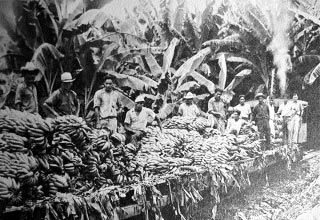
| "Banana Split" is a film that offers a social analysis of the most popular fruit in Canada. |
 |
The banana is the cheapest fruit you can buy in Canada at any time of the year and Canadians eat approximately 3 billion bananas a year. In Canadian supermarkets bananas account for over 10% of total sales in the produce section and 1% of total sales. All this despite the fact that the nearest plantation is 5000 kilometres away and the banana is the most perishable fruit on our store shelves. Banana Split takes the viewer on a journey that begins with the hustle and bustle of a fruit market in Thunder Bay, Ontario and ends up with an examination of the daily challenges of life in Honduras. In addition to being a popular fruit in Canada, bananas are used as a staple food in more than 100 tropical and sub-tropical countries. In the developing world, bananas rank behind rice, wheat and corn as the most important staple food crops. Filmed in Canada, the United States, Honduras and France, “Banana Split” explores the North/South split between Canadian consumers and the people whose lives revolve around the “curvaceous fruit from the herbaceous plant.”
Canadians are accustomed to the Cavendish strain of the fruit which represents about 99% of the bananas that find their way to our food stores. We love bananas for many reasons, including the fact that the fruit is ergonomically shaped to fit the human hand, it comes with a non-slip surface, a colour coded indicator of ripeness, a disposable wrapper with a tab at one end and folded edges for easy pealing and, importantly, it is available year round. However, there are over 1000 varieties of bananas and the fruit also provides a reliable lifeline for poor communities. In Asia, Africa and Latin America, the banana represents the fine line between life, misery and death for millions of people. Bananas provide a reliable source of carbohydrates, grow quickly, protect the soil from sunlight and erosion, and offer a steady source of income. Amazingly, bananas can be grown with little or no investment after the initial purchase of land and planting of the fruit. Diseases and tropical storms do take their toll and scientists funded in part by Canada’s International Development Research Centre are waging a battle to maintain and improve the production of this important staple food crop. Bananas are, therefore, both a an ideal snack food or dessert item for the Canadian consumer, and a crop that is perfectly suited to provide a livelihood and subsistence for small holder producers in the developing world. “Banana Split” looks at the issues and challenges viewers to pay closer attention to the fruit we all take for granted.
The film begins with Canadian consumers in a local fruit market and winds its way through the hustle and bustle of a major distribution centre, to the daily challenges of everyday life in Honduras and ends with a message about small holder banana production as a potential vehicle for international development. Viewers get a lesson in the history of bananas, witness the highly sophisticated system of production and transportation involved in bringing the fruit to market and are introduced to Canadian sponsored efforts to help secure the banana as a staple food source in the developing world. “Banana Split” consists of interviews with people who buy, sell, study and, importantly, produce bananas. The object is to produce an entertaining, yet informative film that challenges common notions about bananas. Viewers will learn about the science of bananas, the problems of marketing and distribution, the effects of disease and natural disasters and will be given reason to pause the next time they visit their local fruit seller. "Banana Split" is produced by Shebandowan Films. For more information about "Banana Split" visit Shebafilms.com or Magic Lantern Communications
The Filmmakers
Kelly Saxberg is a film director and editor who has worked on over 40 films. Among her most recent film credits as a director are "Rosies of the North," (1999), a one-hour National Film Board production that examines the role of women in the production of aeroplanes during World War Two. A testament to Saxberg’s ability as a director is the fact that “Rosies of the North” has been seen by several hundred thousand Canadians on the History Channel, the Women’s Channel, the Documentary Channel, TVO, the SCN, and has recently been sold to Biography Channel, and the Civilization Channel. “Letters from Karelia,” her forthcoming film, is a feature length National Film Board production about Canadians who emigrated to Soviet Karelia in the 1930s. Kelly also directed the ninth episode of “Pioneer Quest,” a one-hour documentary for the Life Channel about two couples who return to the 21st century after having lived for a year as “pioneers” in Manitoba. As an editor, Kelly’s credits range from work on award winning dramas like the National Film Board’s “For Angela” to documentary series like the nine episodes of “Pioneer Quest”, which set Canadian records for viewership, to numerous one-hour documentaries in French and in English.
Ron Harpelle is an Associate Professor of Latin American and Caribbean history at Lakehead University. Although Harpelle has a Ph.D. in History, he also has a background in Development Economics and has been involved in several development projects in the Caribbean and Central America. Harpelle specializes in the social history of the banana industry in Central America. He has published one book and several articles related to the history of the banana business in Central America. Harpelle’s most recent research, some of which was devoted to “Banana Split,” is supported by a SSHRC Research Grant and by an IDRC “Canada and the World Grant.” Ron Harpelle is an award winning teacher and researcher. In addition to his academic success, Ron Harpelle has a range of film credits including, research, sound recorder, production manager, director and producer.
Current Projects | Contact Information | Home
Copyright Ronald N.
Harpelle
Last revised: January 31, 2001